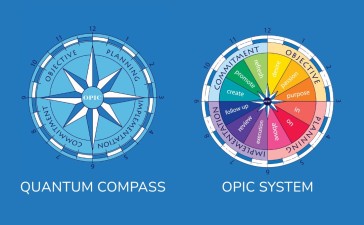Rumination is a cognitive process characterized by excessive and repetitive thoughts, often focused on negative experiences, past mistakes, or worries about the future. It is a form of persistent and intrusive thinking that can consume mental energy and interfere with other cognitive processes, decision-making, and overall well-being.
Rumination can occur frequently in leaders for several reasons:
- Responsibility and high stakes: Leaders bear a significant responsibility for their organization’s success, decision-making, and the well-being of their teams. This pressure can lead to overthinking and obsessing over potential outcomes or past missteps.
- Perfectionism: Many leaders strive for excellence and have high standards, which can contribute to a perfectionist mindset. Perfectionists tend to ruminate over perceived flaws or shortcomings, leading to repetitive negative thoughts.
- Fear of failure: Leaders often face scrutiny and expectations from stakeholders, which can breed a fear of failure. This fear can manifest as rumination, with leaders obsessing over potential setbacks or mistakes.
- High stress and workload: The demanding nature of leadership roles, coupled with heavy workloads and tight deadlines, can create a breeding ground for rumination as a coping mechanism for stress.
To deal with rumination and break the cycle of negative thought patterns, leaders can adopt the following strategies:
- Mindfulness and present-moment awareness: Practicing mindfulness techniques, such as meditation or deep breathing exercises, can help leaders stay grounded in the present moment and detach from ruminating thoughts.
- Cognitive restructuring: Leaders can learn to challenge and reframe negative thought patterns through cognitive-behavioral techniques. This involves identifying irrational or distorted thoughts and replacing them with more balanced and constructive perspectives.
- Acceptance and letting go: Sometimes, rumination stems from an inability to accept situations beyond one’s control. Leaders can practice acceptance and learn to let go of what they cannot change, redirecting their energy towards what they can influence.
- Self-care and stress management: Prioritizing self-care practices, such as exercise, proper nutrition, and relaxation techniques, can help manage stress levels and reduce the likelihood of rumination.
- Seeking support: Leaders can benefit from seeking support from trusted colleagues, mentors, or professionals who can provide objective perspectives and help them break free from ruminating thought patterns.
- Scheduling “worry time”: This technique involves allocating a specific time each day to address concerns and worries, limiting rumination to that designated window and consciously letting go of those thoughts outside of that time.
- Engaging in distracting activities: When rumination becomes overwhelming, leaders can engage in distracting activities, such as reading, listening to music, or pursuing a hobby, to shift their focus and break the cycle of negative thoughts.
Rumination can be a detrimental habit for leaders, consuming mental energy and hindering productivity, decision-making, and overall well-being. By recognizing the triggers and adopting strategies like mindfulness, cognitive restructuring, acceptance, self-care, and seeking support, leaders can break free from the cycle of obsessional thinking and cultivate a more balanced and constructive mindset, ultimately benefiting themselves and their organizations.
Want to learn more?
- Find out more
- Launch Pad + Accelerator Expressions of Interest
- Selling and Licensing Your Art & Designs Around the World with ArtSHINE.
We’re here to help you to take action, just like we’ve helped thousands of other entrepreneurs, business owners, and creative professionals all around the globe.
Now is the time to let your passion SHINE.
Now is the time to Make Tomorrow Today!
To your success, Vinh Van Lam and Stuart Horrex Cofounders
ArtSHINE.com





